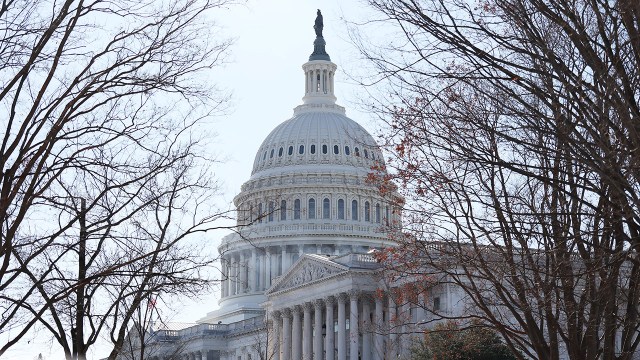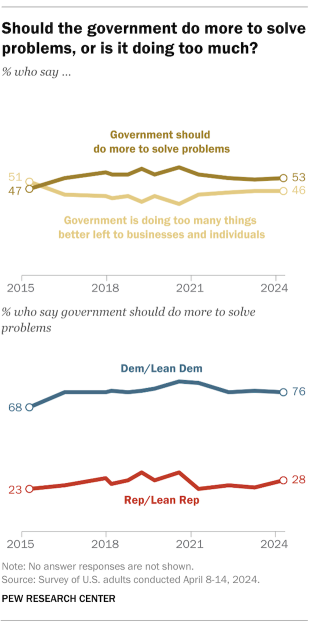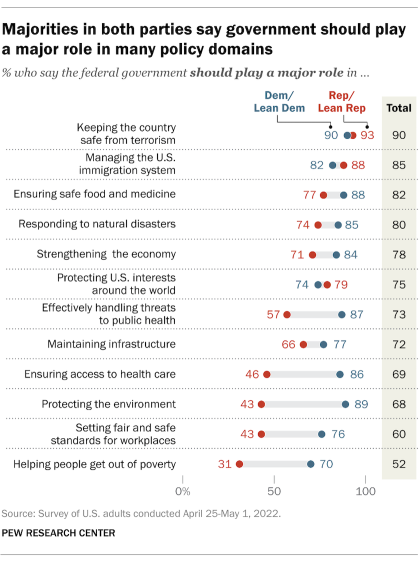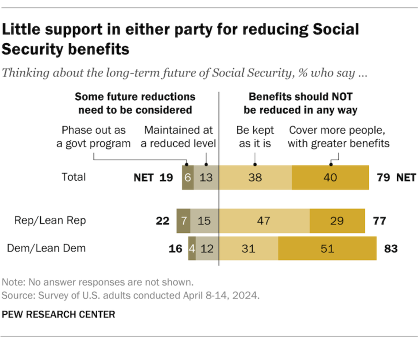
The new Trump administration has made reducing the size of the federal government one of its top priorities. One month in, it has sought to eliminate departments and agencies and shrink the federal workforce, particularly through the work of its Department of Government Efficiency (DOGE) team.
These actions are taking place against a backdrop of long-standing low public trust in the federal government and critiques of the government’s responsiveness and efficiency. Yet most Americans also want government to have a substantial role in addressing many specific areas, and in some cases have supported expanding the role government plays.
Here are five facts about how Americans view their government, drawn from Pew Research Center surveys conducted in recent years.
The public has long been divided – largely along partisan lines – over how large a role government should have. In April 2024, a narrow majority of the public (53%) said government should do more to solve problems, while a somewhat smaller share (46%) said government is doing too many things better left to businesses and individuals. Public opinion on this question has been relatively stable for the last several years.

Yet Republicans and Democrats have consistently offered sharply different views about the role of government. As of last spring:
- 76% of Democrats and Democratic-leaning independents said the government should do more to solve problems.
- 71% of Republicans and Republican leaners said government is doing too much.
Most Democrats have also long said they favor a bigger government that provides more services, while most Republicans have tended to favor a smaller government that provides fewer services.
Critiques of government waste and inefficiency are not new. For much of the last 30 years, Americans have been more likely to see government as wasteful and inefficient than to say it often does a better job than people give it credit for. This was the case in April 2024, when 56% described government as wasteful and inefficient and 42% said it often does a better job than people give it credit for.
There are typically wide partisan gaps in these views, with Republicans much more likely than Democrats to see government as wasteful and inefficient.
Yet both Republicans and Democrats have tended to be less critical of government waste when the president is of their own party.
Americans in both parties support a substantial role for the federal government in many specific domains. Across a variety of issue areas – including managing the immigration system, ensuring safe food and medicine, responding to natural disasters, and maintaining infrastructure – majorities of Americans have long said the government should play a major role.

Support for the government having a role is bipartisan in many of these areas. For example, in a 2022 survey, 85% of Democrats and 74% of Republicans said the federal government should play a major role in responding to natural disasters.
But there are several areas where Republicans express substantially less support than Democrats. In the 2022 survey, Republicans were much less likely than Democrats to say the federal government should play a major role in handling threats to public health, ensuring access to health care, protecting the environment, setting workplace standards and helping people out of poverty.

Bipartisan majorities reject any reductions in Social Security benefits. In the April 2024 survey, large majorities of Republicans and Democrats alike (77% and 83%, respectively) said Social Security benefits should not be reduced in any way, though Republicans were somewhat more likely than Democrats (22% vs. 16%) to say some future reductions to Social Security should be considered. Very few people in either party – 7% of Republicans and 4% of Democrats – favored phasing out the government program entirely.
About three-in-ten Republicans (29%) said Social Security should be expanded to cover more people and offer greater benefits. Roughly half of Democrats (51%) said this.
Democrats are far more likely than Republicans to express confidence in career government employees. Overall, a slim majority of Americans (55%) express a great deal or fair amount of confidence in career employees of the federal government in a survey conducted this year. But the already substantial partisan gap on this question has widened in recent years: 72% of Democrats and 38% of Republicans now express a great deal or a fair amount of confidence in career federal employees. In December 2018, 71% of Democrats and 48% of Republicans said they were confident in these federal civil servants.
